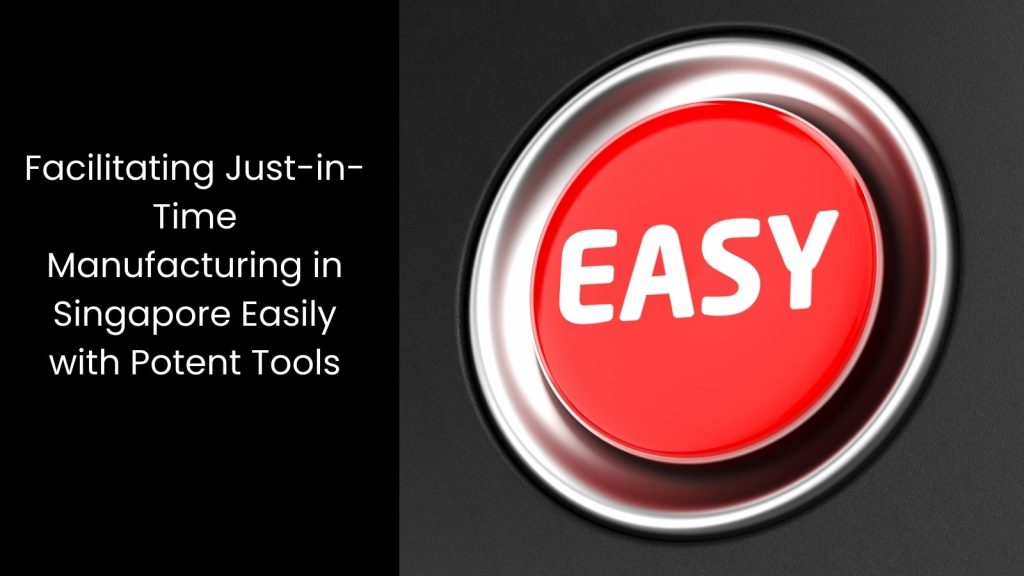In this article, we talk about the importance of implementing Just-in-Time Manufacturing in Singapore in order to get the best outcome.
Understanding Just-in-Time Manufacturing

- This sort of manufacturing is a strategy where companies produce and deliver products exactly when needed, in the exact quantities required. The most outstanding feature of it is that this approach reduces the amount of inventory a company keeps on hand, which can save money and space.
- In JIT manufacturing, a company receives materials and components just in time for production. Therefore, they do not have to store large amounts of raw materials. This is where it is different from other manufacturing methods. As you can see, usually manufacturing companies produce large batches of products and store them in warehouses. Going beyond conventional limitations, JIT helps to cut down on waste because it only makes what is needed when it is required.
- The real mechanism behind JIT involves careful planning and coordination. In this method, manufacturers work closely with suppliers to ensure that materials arrive right when they are needed on the production line. This means having precise schedules and strong communication to avoid delays. JIT also relies on continuous improvement, where companies regularly review and adjust their processes to make them more efficient.
- This method is popular in Singapore due to its strong emphasis on efficiency and technology. Since the latter reduces inventory costs and improves production efficiency, the manufacturing industry in Singapore can offer better prices and faster delivery to their customers.
Top 4 Reasons Why the Manufacturing Industry Needs Just-in-Time Manufacturing

Optimising Space Utilisation
Optimising space utilisation is a key reason why the manufacturing industry benefits from JIT manufacturing. The latter helps reduce the amount of inventory a company keeps on hand. With lower inventory levels, manufacturers can use their facility space more effectively.
When companies store large amounts of raw materials and finished products, they need extra space for these items, which can lead to crowded and inefficient layouts. This often means that a lot of space is wasted on storing goods rather than on actual production activities.
However, with JIT, manufacturers only have to keep a small amount of inventory, which means they need less storage space. This freed-up space can then be used for other important purposes, such as expanding production areas or improving workstations. Plus, this improved layout helps minimise the time it takes to move materials and products through the production stages.
In a way, with less space needed for storage, manufacturers can implement better organisation and cleanliness in their facilities. It is visible that this contributes to a safer and more productive work environment.
Lower Waste Levels
In traditional manufacturing, companies might produce large quantities of products or store extra raw materials. This leads to wasted resources if these goods are not used or sold quickly. For example, excess products might become outdated or spoil, and extra raw materials might become obsolete before they are used.
With JIT, manufacturers only get to create products in the exact amounts required for current orders. This method helps minimise waste as it aligns production closely with actual demand. Since companies do not produce more than needed, they avoid the problem of unsold goods or surplus materials. As it is possible to reduce inventory levels, JIT also prevents the need for large storage areas. This, in turn, cuts down on the resources required for warehousing and handling.
Evidently, JIT supports more sustainable manufacturing practices because it reduces the amount of waste that ends up in landfills. Also, since it helps make sure that production and materials are used efficiently, JIT helps manufacturers use fewer resources overall.
Higher Flexibility
With JIT, manufacturers can focus on producing only what is required at any given time. This approach makes it easier to adjust production schedules and quantities based on current demand.
For example, if a sudden increase in orders occurs, JIT lets companies quickly ramp up production without having to deal with a backlog of unsold products or rework existing inventory. This ability to respond swiftly to changes helps manufacturers stay competitive and meet customer expectations more effectively.
Significant Cost Reduction
It goes this way: When companies hold less inventory, they do not need as much warehouse space, which cuts down on storage costs. Plus, handling fewer goods means less money spent on moving and managing stock, leading to lower operational costs.
If they can keep inventory levels low, JIT can reduce the amount of capital tied up in unsold products and excess materials. They can use this saved money for other purposes, such as investing in new technology or improving production processes. The reduced need for storage space means manufacturers can use their facilities more efficiently. In one way, they can rearrange their production areas to better suit their needs, creating more effective layouts and workflows.
As we mentioned before, JIT reduces the risk of inventory becoming obsolete, which can result in further cost savings. Since they produce only what is essential and when it is important, manufacturing companies can avoid the waste of having to dispose of old stock or deal with markdowns on unsold items.
Cerexio Solutions for the Best Manufacturing Outcome

If achieving the best manufacturing outcome is your goal, you should consider cutting-edge solutions such as Cerexio MES software. The best way to do this is by integrating it into your production line to monitor real-time data, track work orders, and optimise workflows. You can completely rely on our Cerexio MES to improve efficiency, reduce errors, and maximise overall productivity.
Facilitating Just-in-Time Manufacturing in Singapore Easily with Potent Tools

As you can see, implementing Just-in-Time manufacturing in Singapore is indeed a simple process if you go with powerful tools. These tools aid in precise scheduling, real-time data tracking, and effective inventory management, which are essential for JIT’s success. If you hold hands with a reputed software provider, adopting any manufacturing method will be a smooth implementation.
